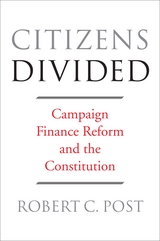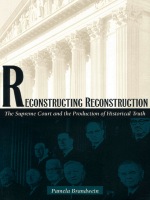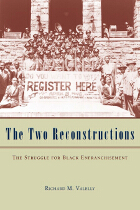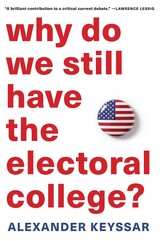
The Supreme Court’s 5–4 decision in Citizens United v. Federal Election Commission, which struck down a federal prohibition on independent corporate campaign expenditures, is one of the most controversial opinions in recent memory. Defenders of the First Amendment greeted the ruling with enthusiasm, while advocates of electoral reform recoiled in disbelief. Robert C. Post offers a new constitutional theory that seeks to reconcile these sharply divided camps.
Post interprets constitutional conflict over campaign finance reform as an argument between those who believe self-government requires democratic participation in the formation of public opinion and those who believe that self-government requires a functioning system of representation. The former emphasize the value of free speech, while the latter emphasize the integrity of the electoral process. Each position has deep roots in American constitutional history. Post argues that both positions aim to nurture self-government, which in contemporary life can flourish only if elections are structured to create public confidence that elected officials are attentive to public opinion. Post spells out the many implications of this simple but profound insight. Critiquing the First Amendment reasoning of the Court in Citizens United, he also shows that the Court did not clearly grasp the constitutional dimensions of corporate speech.
Blending history, constitutional law, and political theory, Citizens Divided explains how a Supreme Court case of far-reaching consequence might have been decided differently, in a manner that would have preserved both First Amendment rights and electoral integrity.

Delving into the circumstances, assumptions, and rhetoric that shaped the “official” story of Reconstruction, Brandwein describes precisely how a dominant interpretation of events ultimately emerged and what its implications have been for twentieth-century judicial decisions, particularly for Supreme Court rulings on civil rights. While analyzing interpretive disputes about slavery, Brandwein offers a detailed rescoring of post–Civil War legislative and constitutional history, including analysis of the original understanding of the Fourteenth Amendment. She identifies the perspectives on Reconstruction that were endorsed or rejected by the Supreme Court. Explaining what it meant—theoretically and practically—to resolve Reconstruction debates with a particular definition of slavery, Brandwein recounts how the Northern Democratic definition of “ending” slavery was not the only definition, just the one that prevailed. Using a familiar historical moment to do new interpretive work, she outlines a sociology of constitutional law, showing how subjective narrative construction can solidify into opaque institutional memory.

The Reconstruction era marked a huge political leap for African Americans, who rapidly went from the status of slaves to voters and officeholders. Yet this hard-won progress lasted only a few decades. Ultimately a "second reconstruction"—associated with the civil rights movement and the Voting Rights Act—became necessary.
How did the first reconstruction fail so utterly, setting the stage for the complete disenfranchisement of Southern black voters, and why did the second succeed? These are among the questions Richard M. Valelly answers in this fascinating history. The fate of black enfranchisement, he argues, has been closely intertwined with the strengths and constraints of our political institutions. Valelly shows how effective biracial coalitions have been the key to success and incisively traces how and why political parties and the national courts either rewarded or discouraged the formation of coalitions.
Revamping our understanding of American race relations, The Two Reconstructions brilliantly explains a puzzle that lies at the heart of America’s development as a political democracy.

The U.S. Supreme Court—at least until Bush v. Gore—had seemed to float along in an apolitical haze in the mind of the electorate. It was the executive branch and the legislative branch that mucked about in politics getting dirty, the judicial branch kept its robes—and nose—clean. The U.S. Supreme Court and the Electoral Process makes it abundantly clear however that before, during, and after the judicial decision that made George W. Bush the President of the United States, everything was, is, and will likely be, politics-including the decisions handed down by the highest court in the land.
This revised and updated edition takes into account not only the recent famous (or infamous, depending on the reader's point of view) judicial decision on the Presidency, but a myriad of others as well in which the U.S. Supreme Court has considered the constitutionality of a wide range of issues involving voting and elections, representation, and political participation. Practitioners and academics in both law and political science examine a number of court actions that directly affect how we choose those who govern us, and how those decisions have affected our electoral politics, constitutional doctrine, and the fundamental concepts of democracy, including: racial redistricting, term limits, political patronage, campaign finance regulations, third-party ballot access, and state ballot initiatives limiting civil liberties.
Of the first edition, CHOICE said, The U.S. Supreme Court and the Electoral Process "plumbs the Supreme Court's constitutive apolitical role as 'primary shaper of the electoral system' and reveals the pervasive involvement of the Court in the political process."

A New Statesman Book of the Year
“America’s greatest historian of democracy now offers an extraordinary history of the most bizarre aspect of our representative democracy—the electoral college…A brilliant contribution to a critical current debate.”
—Lawrence Lessig, author of They Don’t Represent Us
Every four years, millions of Americans wonder why they choose their presidents through an arcane institution that permits the loser of the popular vote to become president and narrows campaigns to swing states. Congress has tried on many occasions to alter or scuttle the Electoral College, and in this master class in American political history, a renowned Harvard professor explains its confounding persistence.
After tracing the tangled origins of the Electoral College back to the Constitutional Convention, Alexander Keyssar outlines the constant stream of efforts since then to abolish or reform it. Why have they all failed? The complexity of the design and partisan one-upmanship have a lot to do with it, as do the difficulty of passing constitutional amendments and the South’s long history of restrictive voting laws. By revealing the reasons for past failures and showing how close we’ve come to abolishing the Electoral College, Keyssar offers encouragement to those hoping for change.
“Conclusively demonstrates the absurdity of preserving an institution that has been so contentious throughout U.S. history and has not infrequently produced results that defied the popular will.”
—Michael Kazin, The Nation
“Rigorous and highly readable…shows how the electoral college has endured despite being reviled by statesmen from James Madison, Thomas Jefferson, and Andrew Jackson to Edward Kennedy, Bob Dole, and Gerald Ford.”
—Lawrence Douglas, Times Literary Supplement
READERS
Browse our collection.
PUBLISHERS
See BiblioVault's publisher services.
STUDENT SERVICES
Files for college accessibility offices.
UChicago Accessibility Resources
home | accessibility | search | about | contact us
BiblioVault ® 2001 - 2024
The University of Chicago Press









